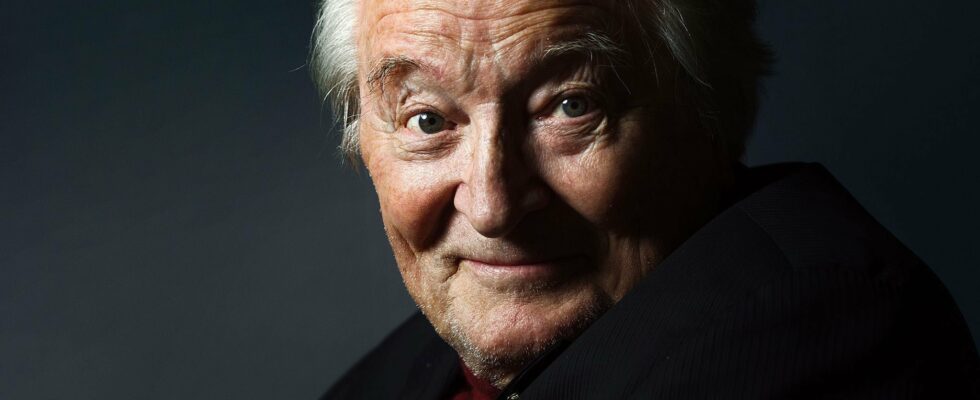Roland Dumas, former foreign minister under François Mitterrand and a leading figure in the Paris bar, died on Wednesday at the age of 101, AFP learned from his entourage. He had also chaired the Constitutional Council between 1995 and 2000. “He left his mark on the history of the Fifth Republic,” said the Minister of Justice, Eric Dupond-Moretti, while Jacques Attali, former special advisor to François Mitterrand at the Elysée, recalled that “after seeing his father shot by the Nazis, (Roland Dumas) was a major player in Franco-German relations.”
Roland Dumas made his mark in the courts with his pleadings as a brilliant lawyer, in the chancelleries with his gifts as a shrewd negotiator and in the salons with his personality as an aesthete and seducer. But his career was tarnished by the Elf scandal which forced him to resign as president of the Constitutional Council and by his criminal conviction in the case of the succession of the sculptor Giacometti.
The man, who shared “fifty years of secrets” with François Mitterrand, for whom he was a minister three times, had a complex personality. Warm and cynical, this fine collector of paintings was also a misogynist and fascinated by money. “In Dumas, only the steering wheel of his Porsche is on the left,” they would joke at the bar. After a “quiet, even monotonous” youth, the life of the law student, born in Limoges on August 23, 1922, was turned upside down in March 1944, when his father, a tax inspector, was shot by the Germans. A “singular wound” that forever marked the young man, himself a member of the Resistance since 1942.
Mitterrand’s lawyer
After the war, he “went up” to Paris, tried his hand at journalism and joined the bar in 1950. Tempted for a while by opera singing, he became, through hard work, one of the tenors of the palace. He met François Mitterrand in circles of former resistance fighters. The two men, who shared the same taste for the arts and seduction, became close after the election in 1956 of Roland Dumas as deputy of Haute-Vienne. In 1959, Mitterrand was accused of having ordered the attack on himself in the Jardins de l’Observatoire. Roland Dumas defended him.
Me Dumas is in the front row as soon as a case smells of sulfur: in the middle of the Algerian War, he defends Francis Jeanson, the organizer of the networks financing the National Liberation Front (FLN). Then he pleads for the civil party in the kidnapping of the Moroccan opponent Ben Barka, defends one of the assassins of the deputy Jean de Broglie and becomes the lawyer of the Canard Enchaîné notably against Valéry Giscard d’Estaing in the Bokassa diamonds affair.
He collected media clients: Chagall, Picasso, the psychoanalyst Jacques Lacan and Jean Genet for whom he had a particular affection. A networker, he joined the Grand Orient in 1980.
Secret Emissary
In May 1981, he was the only loyalist that Mitterrand did not call into government, preferring first to make him his secret emissary to Gaddafi or Bongo. Initially a cautious European, he was nevertheless appointed Minister of European Affairs in 1983. This anti-colonialist naturally became a diplomat and ultimately contributed to several European successes.
“Dumas can do anything as long as he applies himself,” murmured Mitterrand, who offered him the Quai d’Orsay in the Fabius government (1984), then again in 1988. A German speaker, he is remembered as a valuable diplomat in the settlement of the reunification of Germany. In the presidential entourage, some admire his “dazzling intelligence” but criticize his propensity to claim all the major decisions in international politics.
In 1995, François Mitterrand appointed him head of the Constitutional Council to succeed Robert Badinter. “Mitterrand has two lawyers. Badinter, for the law; Dumas, for the crooked,” joked Roger-Patrice Pelat, a loyalist of the president. Coldly received by the Sages, he soon managed to seduce them and convince them to validate the campaign accounts for the 1995 presidential election. “The accounts were clearly irregular,” he admitted in 2015. “What to do? It was a serious case of conscience. Annulling Chirac’s election would have had terrible consequences. I am convinced that I saved the Republic in 1995.”
Politically incorrect
Three years later, the Elf affair broke out. Suspected of having facilitated the hiring of one of his many mistresses, Christine Deviers-Joncour, in companies of the oil group for luxury salaries, Roland Dumas was indicted. He resigned as President of the Constitutional Council in March 2000. This was a first. Convicted at first instance, the dandy of the Republic was acquitted on appeal in 2003. Executor of the will of the sculptor Alberto Giacometti, he was however sentenced in 2007 to a one-year suspended prison sentence and a fine of 150,000 euros for complicity in breach of trust.
After being very ill, the elegant octogenarian with impeccable white blow-dry no longer fears anything and multiplies politically incorrect outings: he defends the comedian Dieudonné after his anti-Semitic statements, flirts with the extreme right. Unperturbed, tireless, this father of three children remains so until the end. He will admit to having had “the terrible desire to end it all” at the time of the Elf affair but will later consider “having lived fully”.
